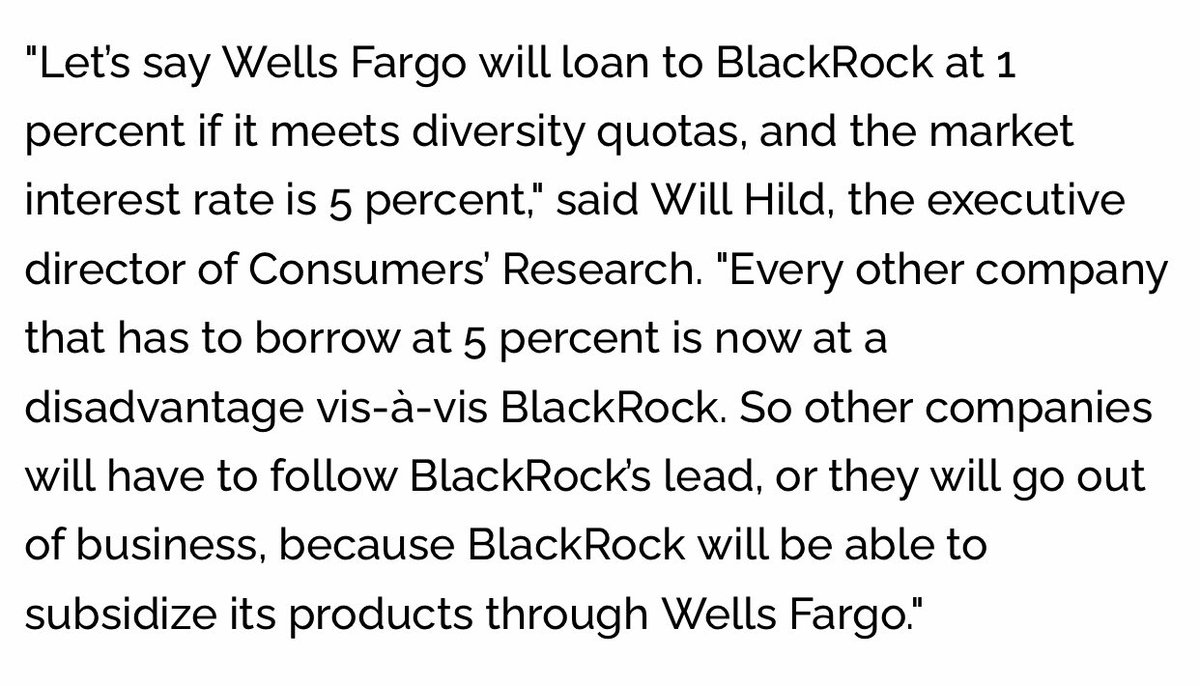
SCOOP: Amid an uptick in race-conscious policies throughout corporate America, many prominent businesses are now writing racial and gender quotas into their credit agreements with banks, tying the cost of borrowing to the companies’ workforce diversity.🧵 freebeacon.com/latest-news/ho…
The businesses that have struck such agreements include Pfizer, the consulting groups Ernst & Young and AECOM, insurers Prudential and Definity Financial, private equity firms BlackRock and the Carlyle Group, the tech company Trimble, and the telecommunications giant Telefónica.
Over the past two years, each of those companies has secured a lending agreement, known as a credit facility, that links the interest rate charged by banks to the company’s internal diversity targets, creating a financial incentive to meet them.
If the business achieves its targets, it won’t have to pay as much interest on the loans it takes out; if it falls short, it has to pay more.
Under the terms of BlackRock’s credit facility, for example, lenders will lower the firm’s interest rate by 0.05% if it hits two targets—a 30% increase in black and Hispanic employees by 2024, and a 3% increase in female executives each year—or hike it by 0.05% if it misses both.
The agreements, which typically involve multiple banks, are effectively credit cards for businesses: Rather than make a onetime loan, lenders extend a continuous line of credit that companies can dip into at will, either to cover operating costs or as a rainy day fund.
That means changes in a facility’s interest rate—even modest ones like BlackRock’s 0.05 percent diversity adjustment—can have an appreciable effect on a business’s bottom line.
Companies have advertised these agreements as proof of their progressive bona fides. Trimble, for example, says that its credit facility—which conditions interest rates on the percentage of female employees—illustrates its "commitment" to "gender diversity in the workplace."
In press releases announcing their own credit facilities, executives at BlackRock, Prudential, and Definity say the agreements demonstrate their commitment to "accountability."
But critics see something far more sinister: a form of blatant discrimination that will harm consumers, credit markets, and the rule of law.
"If a bank penalized a company's credit rating because it had too many women or was too racially diverse, we would be appalled," said one senior government regulator, who managed a nine-figure credit facility as a lawyer in private practice.
"This is the exact same thing, except the penalized target is white men."
The credit contracts will divert resources away from consumers, critics say, and toward diversity initiatives, where the promise of discounted loans will encourage the use of illegal hiring quotas.
They will also hurt companies that don’t negotiate a diversity discount on their loans, because those firms will face higher borrowing costs than their competitors—a dynamic that could steer entire industries toward race-conscious policies.
Consider the following hypothetical:
Consider the following hypothetical:

The contracts represent a new twist on the ESG-linked loans that have proliferated in recent years. When banks lend to businesses, they typically base interest rates on several factors, such as a company’s cost structure or debt ratio, that drive credit risk.
Since 2017, however, some banks have also factored in ESG considerations—a borrower’s carbon footprint, for example—in addition to the ability to pay back a loan.
With diversity quotas in the mix, that gap between credit risk and credit access has only grown.
With diversity quotas in the mix, that gap between credit risk and credit access has only grown.
"There is no evidence that diversity makes a borrower likelier to repay its loan," the government regulator said. "It’s like handing out credit based on astrological sign."
When a bank lends irrationally to one client, the regulator added, it "invariably makes its loan terms less fairly priced for everyone else."
The credit deals come as race-conscious programs are exploding across corporate America—and sometimes in the companies’ own faces. Pfizer, one of the businesses that has tied its lending costs to diversity, was sued in September over a fellowship that bars whites and Asians.
Programs at Microsoft, IBM, and Google use similar criteria, as do American Express and Amazon, both of which are now facing civil rights lawsuits.
Race-conscious loans will encourage such policies, legal experts said, and could expose companies to legal liability.
Race-conscious loans will encourage such policies, legal experts said, and could expose companies to legal liability.
Even if businesses don’t adopt overt quotas, said Adam Mortara, a prominent civil rights litigator, the agreements could be used as evidence that the firing of a white or Asian employee was racially motivated, "because of the incentives race-based discounting creates."
That said, it’s not clear whether the contracts are illegal in and of themselves. There is no federal civil rights law that directly bans discrimination in business loans, three lawyers said, unlike discrimination in consumer lending and employment.
"You could argue the agreements themselves are permissible as long as the businesses reach their diversity targets without violating civil rights law," said Will Hild, the executive director of Consumers’ Research, who also founded the public interest law firm Cause of Action.
Other lawyers said the contracts created such a strong incentive to discriminate that courts might strike them down. If a business cannot boost its minority employment through race-blind means, hard quotas will be the only for it to avoid losing money under the terms of the loan.
"This is an implicit violation of the Title VII," the law that prohibits employment discrimination, said James Copland, the director of legal policy at the Manhattan Institute. "It has to be illegal."
Credit facilities are the product of complex, confidential negotiations between a company and its lenders, making it difficult to know which party proposed what provisions, though all clauses must have the signoff of both banks and borrowers.
It might seem odd for businesses to risk a choice between breaking the law or hurting their pocketbooks. But if a company is ideologically committed to quotas, Hild said, the credit deals can make a kind of circular sense, in both economic and legal terms.
Economically, the company gets a discount for a policy that it was already going to implement. Legally, it gets a shield against shareholders who see diversity initiatives as a drag on performance—because, under the terms of the loan agreement, more diversity means lower costs.
"The company can argue that its diversity policies make borrowing less expensive, and thus fulfill its legal obligation to shareholders," said Dan Morenoff, the executive director of the American Civil Rights Project.
The counterargument is that these policies are very vulnerable to civil rights complaints. If a court enjoins a company’s race-conscious programs, it might not be able to meet the diversity targets specified in its credit agreement, in which case borrowing costs would go up.
The calculus is similarly complex for banks. On the one hand, lenders will make less money if they loan to businesses at a discounted rate.
On the other hand, Hild said, linking the discounts to ESG objectives, including diversity, may boost banks’ ESG scores and thus attract capital from ESG investors—some of which, like BlackRock, are themselves the recipients of ESG loans.
The private equity firm also owns 7.1 percent of Wells Fargo, the bank managing its credit facility, and likely holds stock in other participating lenders as well. So when BlackRock secures an ESG loan from those banks, it may indirectly be boosting the value of its own equities.
The result—if nobody sues—is a win-win for both lender and borrower. The losers are innovators, pensioners, and the consumers, who will bear the costs of a distorted market.
"The purpose of bank lending is to allocate capital to its best use so that we can have better products at a lower price," Hild said. "If you subsidize diversity, you are focusing the market on other things."
• • •
Missing some Tweet in this thread? You can try to
force a refresh





